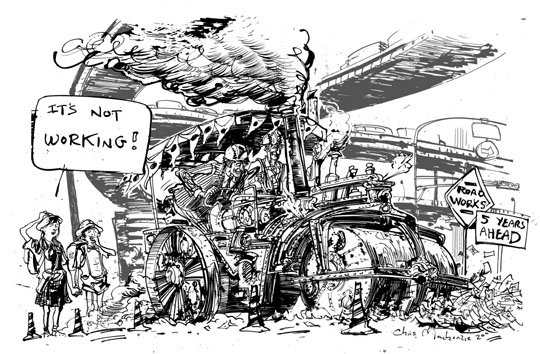While there are many roads to democracy and prosperity, in Japan it is roads that may take the country in a different direction. In their latest book on construction in Japan, "Doro o do suru ka" ("What to do about the roads?"), lawyer Takayoshi Igarashi and journalist Akio Ogawa paint a bleak picture of how the "road tribes" — the impenetrable scrum of bureaucrats, politicians and industry that benefit from an ever-expanding program of road construction — are literally paving the road to national ruin.
Road policy received a great deal of attention in early 2008 with the so-called "gasoline Diet." Having lost control of the Upper House, the Liberal Democratic Party-New Komeito ruling coalition was unable to have the Diet rubber-stamp the renewal of a "temporary" gasoline tax set to expire in March of that year. Ultimately, they were able to use their majority in the Lower House to renew that tax through a legislative override, but not before it expired briefly (resulting in a period during which the price of gasoline dropped by about ¥25 a liter) and generated widespread debate about this seemingly innocuous source of government revenue.
The real issue in this debate was not so much whether the gasoline tax should be renewed, but whether the revenues should go into the general tax coffers and applied to much-needed social programs and education, areas where Japan lags behind most developed countries in public spending. This battle was lost, and the tax remains earmarked for road repairs and the construction of unneeded expressways, not to mention the occasional massage chair for public road company employees.


















With your current subscription plan you can comment on stories. However, before writing your first comment, please create a display name in the Profile section of your subscriber account page.